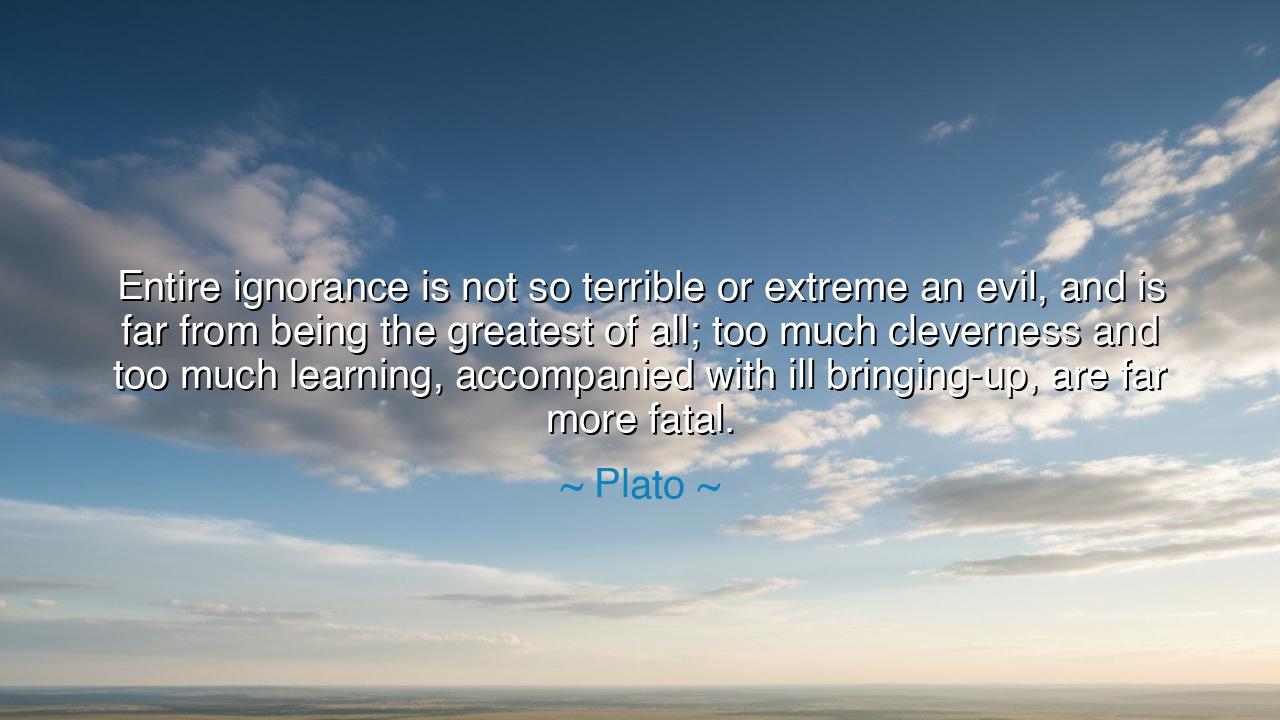
Entire ignorance is not so terrible or extreme an evil, and is
Entire ignorance is not so terrible or extreme an evil, and is far from being the greatest of all; too much cleverness and too much learning, accompanied with ill bringing-up, are far more fatal.






“Entire ignorance is not so terrible or extreme an evil, and is far from being the greatest of all; too much cleverness and too much learning, accompanied with ill bringing-up, are far more fatal.” — Plato
Hear these words, O seeker of wisdom, spoken by Plato, the philosopher of Athens, whose mind shone like the sun over the seas of thought. In this saying, he warns mankind of a subtle and dangerous evil — not the darkness of ignorance, but the corruption of knowledge without virtue. For ignorance, though blind, can be cured by learning; but cleverness joined with arrogance, and learning untempered by morality, become weapons of destruction. To be ignorant is to lack light; but to be learned and wicked is to wield light as fire, burning all it touches.
The origin of these words lies deep in the heart of Plato’s teachings. In his dialogues, he often spoke of the harmony between the mind, the soul, and the character. To him, true education was not the stuffing of facts into the mind, but the shaping of the soul toward the good. He saw that some men, eager for cleverness, learned not to live wisely but to argue endlessly, to deceive, and to exalt themselves above others. He beheld that ungoverned intellect — knowledge without virtue — was more dangerous than ignorance itself, for it gave men the power to justify their evil with reason. Thus, Plato declared that the greatest peril is not to know little, but to know much and love nothing.
Consider, my child, the story of Athens herself — the city that gave birth to philosophers and poets, yet condemned Socrates, the wisest of them all. The Athenians were clever; they prided themselves on rhetoric and debate, yet their hearts were empty of humility. They valued speech above truth, and cleverness above justice. When Socrates stood before them, urging them to examine their own souls, they mocked him, then silenced him with poison. This was the triumph of cleverness without goodness — the very evil Plato spoke of. It was not ignorance that killed Socrates, but the arrogance of men who thought themselves wise.
In every age, the same poison reappears. History is filled with scholars, rulers, and inventors who possessed great knowledge but no compassion. They harnessed science for conquest, intellect for domination, and reason for cruelty. The clever mind without a noble heart becomes a serpent — intelligent, but cold, cunning, and without mercy. The greatest evils of humanity have often been born not from fools, but from those too clever for conscience. Plato saw this truth, and his words ring as prophecy through the ages.
Do not misunderstand him, for Plato did not despise learning — he revered it. But he knew that learning must be married to virtue. The mind must be governed by the heart, and knowledge guided by moral purpose. A child taught all the sciences but left without discipline or compassion grows dangerous to himself and to others. The wise teacher therefore cultivates not only intellect, but character — for knowledge teaches how to act, while virtue teaches why. Without that “why,” man becomes a master of the world and a slave of his own passions.
Remember this, O disciple of thought: ignorance is a void that truth can fill, but corrupted wisdom is a sword that wounds its wielder. It is better to know little and be kind, than to know all things and be cruel. The humble man who admits his ignorance may yet learn truth; the arrogant man who believes himself all-knowing is forever blind. Therefore, let your pursuit of knowledge be tempered by humility, your cleverness softened by compassion, and your learning anchored in love.
Let your daily practice be this: seek not to be clever, but to be good. Read, question, and reason, but always ask yourself — does this knowledge serve goodness? Does it make the world gentler, wiser, and more just? Teach your children that wisdom is not in brilliance of speech, but in the purity of heart. For clever words fade, but noble deeds endure.
So heed the ancient voice of Plato: the true student is not the one who knows the most, but the one whose knowledge makes him better — kinder, truer, more whole. For in the end, it is not brilliance that redeems the soul, but the harmony of mind and virtue. Guard that harmony, and you will walk the path of the truly wise — illuminated not by the cold light of cleverness, but by the radiant fire of wisdom.






AAdministratorAdministrator
Welcome, honored guests. Please leave a comment, we will respond soon